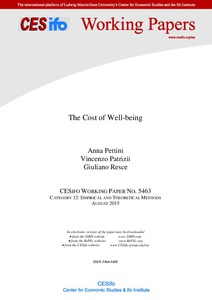The cost of well-being
"Since measures of well-being are meant to be an exercise in documentation, but also a tool for policies and priorities, we suggest an operative way to use them. We evaluate both technical and social efficiency of countries in producing the Better Life Index (BLI) objectives. To assess the effi...
| Main Authors: | , , |
|---|---|
| Institution: | ETUI-European Trade Union Institute |
| Format: | TEXT |
| Language: | English |
| Published: |
Munich
2015
CESifo |
| Subjects: | |
| Online Access: | https://www.labourline.org/KENTIKA-19100785124919289679-The-cost-of-well-being.htm |
| Summary: | "Since measures of well-being are meant to be an exercise in documentation, but also a tool for policies and priorities, we suggest an operative way to use them. We evaluate both technical and social efficiency of countries in producing the Better Life Index (BLI) objectives. To assess the efficiency test, we use Data Envelopment Analysis integrated with Principal Component Analysis. Our analysis shows that BLI increases with GDP only for poor countries, extending the Easterlin Paradox to the quality of life measurement; that good performances in BLI are not necessarily due to a high efficiency of the whole system; and that social efficiency is the best predictor of development." |
|---|---|
| Physical Description: | 19 p. Digital |

